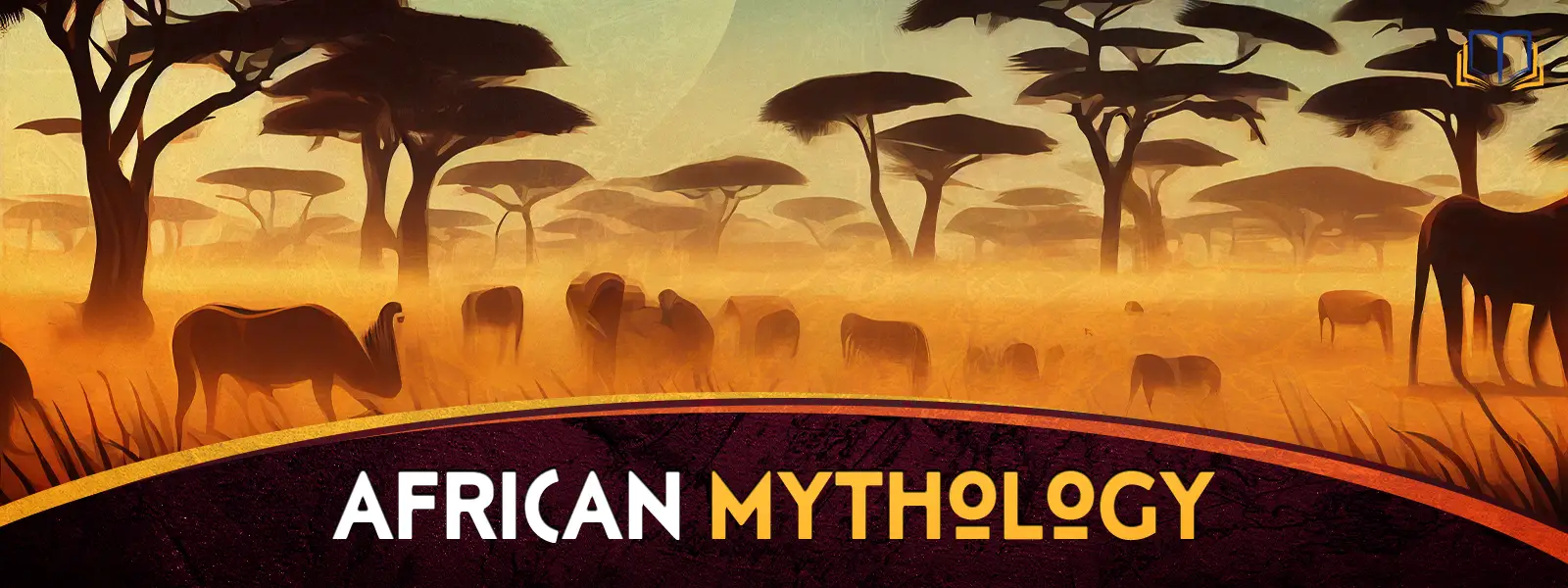African mythology is a captivating and complex subject, with a rich history and a wealth of traditional stories and legends.
For centuries, these myths and legends have been passed down through the generations, providing insight into the beliefs, values, and culture of the diverse peoples of Africa.
In this ultimate guide, we will delve into the world of African mythology, exploring its origins, key figures, and common themes and motifs.
Whether you are a student of mythology, a lover of folklore, or simply curious about the cultural traditions of Africa, this guide will provide a fascinating introduction to this fascinating subject.
Get ready to discover the rich and varied world of African mythology!
Latest Entries
If you’d like to learn more about African Mythology, we’re consistently putting out more articles where we can. Here are all the latest:
What is African Mythology?
African mythology is the traditional beliefs, stories, and religious practices of the people of Africa.
This includes the mythology of the various tribes and ethnic groups that make up the continent, each with their own unique traditions and cultural practices.
Some of the best-known African mythologies include the mythology of the Yoruba of West Africa, and the Zulu of South Africa.
Multiple Mythologies
African mythology is a vast and varied field, with a rich history and a wealth of traditional stories and legends.
Unlike the well-documented mythologies of ancient Greece and Egypt, the myths and legends of Africa are not as well-known or widely studied.
This is due in part to the fact that most of these stories weren’t written down until the 20th century, but also because of the sheer diversity of African cultures, with between 1000 and 2000 different languages spoken across the continent and a corresponding variety of mythological traditions.
What About Egyptian Mythology?
While Egyptian mythology is an important and fascinating aspect of African mythology, it is not included in this article for two reasons.
First, it has already been widely studied and written about, so this article focuses on the lesser-known mythologies of other African cultures.
Second, Egyptian mythology is closer to the mythologies of other Near Eastern cultures than it is to the mythologies of other African cultures, so it is often studied separately.
This article provides an introduction to the rich and varied traditions of African mythology, excluding the well-known mythology of the ancient Egyptians.
The Origins of African Mythology
First, let’s talk a little bit about how African Mythology came to be in its current form.
Isolation
The Sahara desert separates North Africa from the rest of the continent. North Africa has strong ties to the Mediterranean and Arab worlds, and was influenced by Christianity and Islam in ancient times.
Sub-Saharan Africa, on the other hand, had little contact with the rest of the world before the modern era, and the spread of Islam and Christianity has overshadowed many of the region’s indigenous religious beliefs.
Oral Storytelling
Sub-Saharan Africa’s myths and legends developed over thousands of years, influenced by the movements of different people groups.
These migrations caused the spread of myths and legends between groups and led to the mixing of cultural beliefs.
Oral tradition was used to pass down these stories until the arrival of European explorers and colonizers in the early 1800s, when written accounts of African mythology began to appear.
Today, scholars are working to preserve these myths and legends before they are lost to time and cultural change.
Prominent African Myths
Of the many individual stories involving African mythology, there are a few that stand out, including:
- The Creation of the World: this is the story of how the world and everything in it was created by the gods, according to the mythology of various African cultures.
- The Legend of Anansi the Spider: this is a popular tale from West African mythology about Anansi, a clever spider who outwits other animals and even the gods themselves.
- The Tale of Mwindo: this is a heroic epic from the Congo about Mwindo, a great warrior and leader who must face many challenges in order to become the king of his people.
- The Myth of Yemanjá: this is the story of Yemaja, the goddess of the sea and of childbirth, who is worshipped in many parts of Africa.
- The Epic of Sundiata: The Epic of Sundiata is a story of the rise to power of the first ruler of the Mali Empire, Sundiata Keita.
Prominent Mythology Characters
Next, here are some of the most significant characters to feature in African mythology:
- Anansi: The trickster spider-god of Ashanti folklore, Anansi is known for his cunning and wit. He is often portrayed as a spider, but also has the ability to take on human form. He is associated with wisdom and storytelling, and is sometimes seen as the creator of the universe.
- Ogun: The god of iron and war, Ogun is an important figure in West African mythology. He is said to be the first god to come to earth, and is associated with strength, power, and justice. He is often depicted carrying a machete or other iron weapon, and is seen as the patron of blacksmiths and warriors.
- Yemaya: The goddess of the sea and childbirth, Yemaya is an important figure in Yoruba mythology. She is associated with the ocean and its many creatures, and is seen as a protector of women and children. She is often depicted as a mermaid, and is associated with fertility and motherhood.
- Oshun: The goddess of love and beauty, Oshun is associated with the river that bears her name in Nigeria. She is seen as the embodiment of feminine grace and elegance, and is often invoked by women seeking love or fertility. She is also associated with healing and is seen as a protector of the natural world.
- Mbombo: The creator god of the Bantu people of Central Africa, Mbombo is said to have created the universe by vomiting it into existence. He is often depicted as a large, serpentine creature, and is associated with wisdom and knowledge. He is also seen as the guardian of the natural world, and is sometimes invoked to protect against harm.
- Legba: The god of communication and crossroads, Legba is an important figure in the mythology of the Fon people of West Africa. He is often depicted as an old man, and is associated with the sun and the sky. He is seen as a mediator between the human and divine realms, and is often invoked to open the way for communication and understanding.
- Olorun: Olorun is the supreme deity in Yoruba mythology, and is believed to be the creator of the universe. He is considered to be the most powerful of all the gods and is often depicted as being seated on a throne, surrounded by his followers.
Types of Beings in African Myth
There are a wide variety of different types of figures within African Mythology, and they include:
- Dieties: Most African traditional religions have multiple gods, with a supreme god being recognized as the all-powerful creator. This supreme deity is often associated with the sky and is called different names by different cultures.
- Spirits: African mythology is filled with spirits, invisible beings with powers for good or evil. These spirits are associated with physical features and are sometimes worshipped and controlled through magical rituals. All humans, animals, and plants are believed to have spirits, as do elements such as water and fire.
- Ancestors: Many Africans believe that human spirits exist after death and remain near their living descendants to help and protect them. Ancestor cults play a significant role in African mythologies, with the honored dead becoming objects of worship and subjects of tales and legends. Some cultures believe that the souls of the dead may be reborn in new babies or return as snakes.
- Rulers/Heroes: Ancestral kings and heroes may be transformed into minor deities for communities or nations. The line between legend and history is often blurred, with some mythic ancestors starting as real people whose deeds were exaggerated over time, while others are purely fictional. Many African cultures traditionally regarded their rulers as divine or semi-divine. Other legends involve culture heroes who performed great feats or embodied important values.
African Mythology Sources
African mythology is a vast and varied subject, with many different literary sources that have shaped the myths and stories that we know today. Most of them existed, until the 20th century, as oral myths. Which is why we don’t have ancient texts to put on this list. That said, here are some of the most important resources to look up:
- The Epic of Sundiata: This is a West African epic poem that tells the story of the rise of the Mali Empire in the 13th century. The epic centers around Sundiata Keita, who is said to have been a great warrior and leader. This epic is one of the most famous works of oral literature in Africa, and has been translated into many different languages.
- The Tales of Amadou Koumba: This is a collection of folktales from the West African country of Senegal. The tales are told by a griot, or oral historian, and are full of magic and adventure. Many of the stories feature animals as the main characters, and are a great way to learn about West African culture and traditions.
- Bantu Folk Tales: This is a collection of traditional stories from the Bantu-speaking people of Africa. The stories are full of magic, adventure, and wisdom, and are a great way to learn about the beliefs and customs of the Bantu.
- The Mwindo Epic: This is a traditional story from the Congo Basin that tells the tale of the hero Mwindo and his adventures. The epic is an important work of oral literature, and has been passed down through the generations by storytellers and bards. The Mwindo Epic is full of magic, adventure, and wisdom, and is a great way to learn about the beliefs and customs of the Congo Basin.
- The Osun Seegesi: This is a traditional Yoruba tale that tells the story of the goddess Osun and her journey to the land of the dead. The tale is full of magic, adventure, and wisdom, and is a great way to learn about the beliefs and customs of the Yoruba people. The Osun Seegesi is an important work of oral literature, and has been passed down through the generations by storytellers and bards.
African Mythology Creatures
African mythology is full of fascinating creatures. Here are a few:
- Mami Wata: This water spirit is a common figure in African mythology. It is often depicted as a mermaid or river goddess and is associated with wealth, fertility, and beauty. In some stories, Mami Wata is a powerful and dangerous creature who can drown humans or lure them to their deaths.
- Zimwi: In Bantu mythology, the Zimwi is a demon that eats humans and is often depicted as an ogre-like being. In Swahili mythology, the Zimwi is a demon that haunts beings or creatures of darkness, with eight legs and antennae on its head to detect prey. In Hauza mythology, the Zimwi is a demon on a rock, beckoning a child to come closer because it cannot hear what the child is saying.
African Mythology in Popular Culture
African mythology is also present in modern pop culture. Here are a few examples:
- American Gods: This book series (2001) by Neil Gaiman features African gods in a modern-day setting. One of the main characters is Anansi, the trickster spider god from West African mythology.
Wakanda Forever: This Marvel film took inspiration from African mythology and culture in general.


